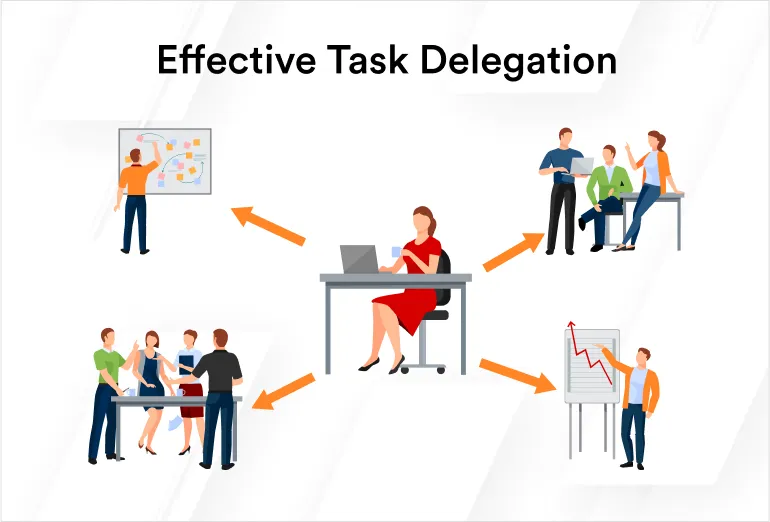Effective Delegation and Empowerment: Building Stronger Teams
Why Delegation Matters in Modern Leadership
In today's fast-paced business environment, the ability to delegate effectively is no longer just a useful skill—it's a necessary leadership competency. Effective delegation serves as the bridge between overwhelming leadership burdens and empowered, high-performing teams.
At Al Mithaq Institute, our leadership programs consistently emphasize delegation as a cornerstone of successful management. But what makes delegation truly effective, and how does it transform into team empowerment?
Did You Know?
According to research, leaders who excel at delegation can achieve up to 33% more productivity than those who struggle to delegate tasks effectively.
The Core Principles of Effective Delegation
Delegation is far more than simply assigning tasks. It's an intentional transfer of responsibility that, when done correctly, benefits both the leader and the team member. Here are the fundamental principles that guide effective delegation:
- 1
Clarity of Expectations: Communicate exactly what needs to be accomplished, including quality standards, deadlines, and available resources.
- 2
Authority with Responsibility: When you delegate a task, ensure you also provide the necessary authority to complete it successfully.
- 3
Match Skills to Tasks: Assign responsibilities based on individual strengths, experience, and development needs.
- 4
Provide Support Without Micromanaging: Remain available for guidance while allowing autonomy in execution.
- 5
Focus on Results, Not Methods: Allow team members to find their own approaches to problem-solving when possible.

From Delegation to Empowerment: Bridging the Gap
While delegation focuses on task assignment, empowerment creates an environment where team members can thrive, innovate, and take ownership. True empowerment happens when:
Trust Becomes Fundamental
Empowerment begins with demonstrating trust in your team's capabilities. This trust must be genuine and visible in your actions, not just your words.
Decision-Making Authority Expands
Empowered team members have the freedom to make decisions within clearly defined boundaries, allowing for faster response times and innovative solutions.
Growth Becomes Intentional
Delegation with the purpose of developing skills creates opportunities for team members to stretch beyond their comfort zones in supported environments.
Feedback Flows Freely
Two-way feedback channels ensure continuous improvement, with both praise for achievements and constructive guidance for development.
Overcoming Common Delegation Barriers
Many leaders understand the importance of delegation but still struggle to implement it effectively. Let's address the most common barriers and how to overcome them:
The Perfectionist Trap
Challenge: "No one can do this as well as I can."
Solution:
- Recognize that perfection may not always be necessary
- Focus on the development opportunity the task presents
- Accept that different approaches may yield equally valid results
- Set clear quality standards but allow for learning curves
The Control Concern
Challenge: "I'll lose control of the project if I delegate."
Solution:
- Establish clear checkpoints for progress reviews
- Start with smaller delegations to build trust
- Focus on outcomes rather than controlling processes
- Use delegation as an opportunity to develop monitoring skills
The Time Pressure Excuse
Challenge: "It's faster if I just do it myself."
Solution:
- Recognize delegation as an investment in future time savings
- Start with detailed instructions for first-time delegations
- Create templates and processes that facilitate faster delegations
- Schedule time specifically for delegation and training
Building a Culture of Empowerment Through Strategic Delegation
When delegation becomes part of your organizational culture, the benefits extend beyond individual task completion. Here's how strategic delegation builds a culture of empowerment:
-
Create Delegation Pathways
Establish clear guidelines for which types of decisions and tasks can be delegated at different levels, creating transparency around autonomy boundaries.
-
Celebrate Delegation Successes
Publicly recognize both the delegator and delegate when delegated tasks lead to success, reinforcing the value of the practice.
-
Incorporate Delegation into Performance Reviews
Evaluate leaders not just on their personal achievements but on their effectiveness in delegating and developing their team members.
-
Train for Delegation Excellence
Provide formal training on delegation skills at all leadership levels, from first-time supervisors to executive leaders.
Al Mithaq Institute's Leadership Development Programs
Our leadership programs specifically address delegation and empowerment skills through practical exercises, case studies, and personalized coaching.
Explore Our ProgramsMeasuring the Impact of Effective Delegation
How do you know if your delegation efforts are truly effective? Consider these key performance indicators:
Team Productivity
Measure overall output compared to before implementing strategic delegation
Employee Engagement
Track changes in engagement scores after increasing delegation responsibilities
Decision Bottlenecks
Monitor reduction in delays caused by waiting for leadership decisions
Leadership Pipeline
Assess the number of team members ready for advancement due to delegated responsibilities
Practical Steps to Start Delegating More Effectively Today
Whether you're new to delegation or looking to enhance your current approach, these practical steps will help you implement more effective delegation immediately:
Audit Your Task List
Review your weekly tasks and identify those that could be delegated. Look for tasks that are time-consuming but don't require your specific expertise or authority.
Create Task Packages
Group related tasks together to delegate meaningful chunks of work rather than disconnected activities. This helps team members see the bigger picture and purpose.
Develop Delegation Scripts
Prepare how you'll communicate delegated tasks, ensuring you cover the what, why, when, and how of each assignment clearly and completely.
Schedule Follow-ups
Create a system for checking in on delegated tasks that provides support without micromanaging. Calendar reminders for check-ins can help maintain accountability.
Document Delegation Outcomes
Keep track of what was delegated, to whom, and the results. This documentation will help you refine your delegation strategy over time.
Conclusion: Delegation as a Leadership Multiplier
Effective delegation isn't just about distributing workload—it's about multiplying your impact as a leader. By entrusting responsibilities to your team members, you create opportunities for growth, build organizational capacity, and free yourself to focus on strategic priorities.
The journey from delegation to empowerment requires intention, trust, and consistent practice. As you refine your delegation skills, you'll find that your team's capabilities expand, innovation flourishes, and a positive cycle of continuous development takes hold.
At Al Mithaq Institute, we believe that mastering the art of delegation is fundamental to modern leadership success. Our programs provide the frameworks, tools, and personalized guidance to help you transform your delegation approach and build truly empowered teams.
Frequently Asked Questions
What's the difference between delegation and dumping?
Delegation involves thoughtful assignment of tasks with proper context, support, and development intent. Dumping is simply offloading unwanted work without adequate instruction or purpose.
How do I delegate to someone who seems already overworked?
First, assess their actual workload versus perceived busyness. Then have an open conversation about priorities, potentially helping them delegate or eliminate lower-value tasks to make room for higher-value assignments.
What types of tasks should never be delegated?
While context matters, generally avoid delegating confidential matters, personal responsibilities, final accountability, performance reviews of direct reports, and crisis management requiring your specific authority.
How can I delegate when I'm not in a formal leadership position?
Focus on peer delegation through collaborative approaches: request assistance based on skills alignment, offer reciprocal help, clearly communicate needs and timelines, and approach colleagues with respect for their autonomy.







